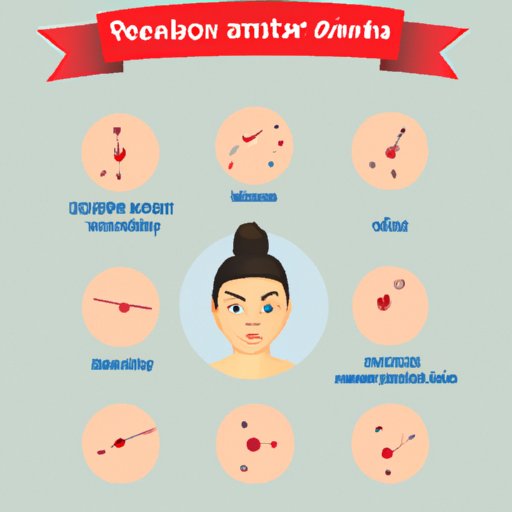Introduction
Acne scars are a common problem that many people face, but they can be difficult to understand. Acne scars are caused by inflammation from acne lesions, which damage the collagen and elastin in the skin. These scars often appear as indentations, bumps, or discoloration on the skin, and can be both physically and emotionally distressing.

Causes of Acne Scars and How to Treat Them
There are several possible causes of acne scars, including hormonal imbalances, bacterial infections, and medication side effects. Hormonal imbalances can cause an increase in sebum production, leading to clogged pores and inflammation. Bacterial infections such as Staphylococcus aureus can also cause inflammation and lead to scarring. Finally, certain medications can cause dryness, redness, and irritation, all of which can contribute to the development of acne scars.
Fortunately, there are several treatment options available to help reduce the appearance of acne scars. Over-the-counter creams and gels containing retinoids, hydroquinone, and glycolic acid can help reduce the appearance of scars. Additionally, laser treatments and chemical peels can help reduce the appearance of deep scars. Finally, microneedling is a newer treatment option that can help stimulate collagen production and reduce the appearance of scars.

Understanding the Different Types of Acne Scars
It’s important to understand the different types of acne scars in order to determine the best course of treatment. Hypertrophic scars are raised and thickened scars, while atrophic scars are depressed and thin scars. Ice pick scars are deep, narrow scars, while boxcar scars are broad, angular scars. Knowing the type of scar you have can help you determine the most appropriate treatment.
Natural Remedies for Acne Scarring
In addition to medical treatments, there are several natural remedies that can help reduce the appearance of acne scars. Apple cider vinegar can help reduce inflammation and exfoliate the skin, while aloe vera can help heal and soothe the skin. Honey is a natural antibacterial agent and can help reduce inflammation, and coconut oil can help moisturize and nourish the skin. Finally, tea tree oil is a natural antiseptic and can help reduce inflammation.

The Latest Advances in Acne Scar Treatment
The latest advances in acne scar treatment include laser resurfacing, chemical peels, and microneedling. Laser resurfacing uses a carbon dioxide (CO2) laser to target damaged skin cells and reduce the appearance of scars. Chemical peels use a variety of acids to remove the top layer of dead skin cells and stimulate collagen production. Microneedling uses tiny needles to create microscopic channels in the skin, which helps promote collagen production and reduce the appearance of scars.
How to Cover Up Acne Scars with Makeup
If you want to cover up your acne scars with makeup, it’s important to choose the right products. Start with a full-coverage foundation to even out your skin tone. Then, use a concealer to cover up any discoloration or redness. Finally, set your makeup with a powder to help it stay in place all day.
Conclusion
Acne scars can be physically and emotionally distressing, but there are several treatment options available. Understanding the different types of acne scars can help you determine the best course of treatment, and there are also natural remedies and the latest advances in acne scar treatment that can help reduce their appearance. Finally, if you want to cover up your acne scars with makeup, make sure to choose the right products.
If you’re looking for more information on acne scars, there are several resources available online. The American Academy of Dermatology website is a great place to start, as it provides detailed information on treatment options and other helpful tips. Additionally, speaking to a dermatologist can be helpful in determining the best course of treatment for your individual needs.


